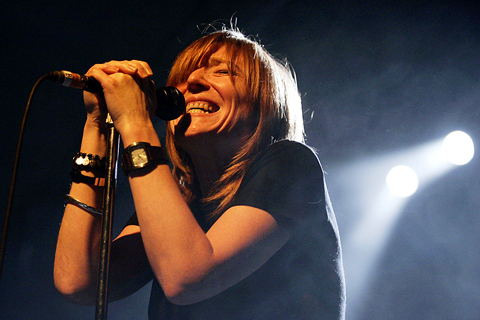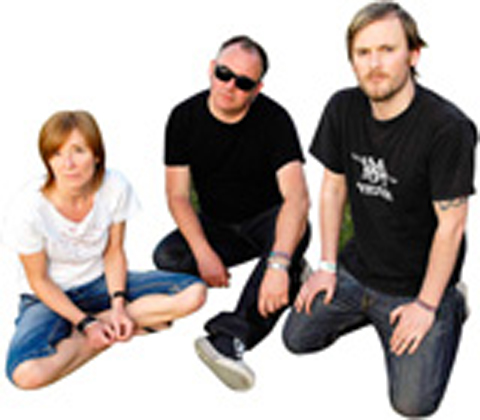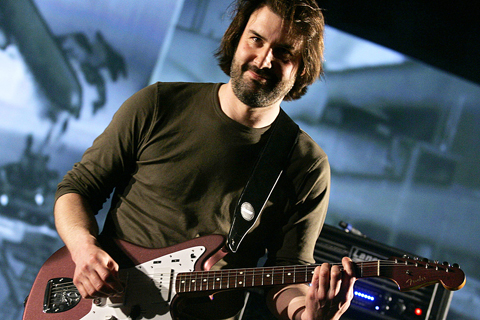For a band that not so long ago had been left for dead, Portishead is enjoying a triumphant year so far. Third, its first studio album in 11 years, went straight to number two in the British charts a month ago, buoyed by almost unanimously ecstatic reviews. The band’s brief world tour has been equally well received. Other once-popular bands have reappeared after less time to find that the world no longer gives a tinker’s cuss about them — just ask Elastica or the Stereo MCs — so you might think that all this warm attention would gladden the heart of producer/multi-instrumentalist Geoff Barrow. But you would be wrong.
“Everything’s a nice surprise, but it doesn’t fill us with joy,” he says, his face crinkling into a pained expression. “My wife Emma called up and said, ‘Have you got the midweeks [chart positions] in?’ And I said, ‘Well no, not really. We’re not that bothered.’ And she’s like, ‘Well why? Don’t be silly. It’s brilliant. Fucking cheer up a bit.’” His wonky, self-mocking grin suggests that was not the first time he had heard those words.
Sitting outside Paris’s Zenith concert hall in the waning sunshine of a glorious spring evening, the 36-year-old Barrow is an amiable curmudgeon, quick to rail colorfully against what he hates about the modern world (almost everything, it seems), but equally quick to laugh at himself. Never mind what anyone thinks of Third, he says: all that matters is that he, guitarist Adrian Utley and vocalist Beth Gibbons have actually finished the thing.

PHOTO: AP AND AFP
Once labeled trip-hop, alongside fellow West Country innovators Massive Attack and Tricky, Portishead now have more in common with Radiohead: the fretful, left-leaning politics (Barrow deems Conservative Party leader David Cameron “a weasely fucking knobpuppet”); the old-fashioned principles (they have never licensed a song to an advert); the dogged determination to overhaul their sound, and the potent combination of bold, strange music with raw emotion. Third could be this year’s Kid A: an art-house statement, full of wrong-footing structures, sonic ambushes and gnomic anguish, that somehow finds its way into a lot of record collections.
Success creates its own logic. Because Portishead’s 1994 debut Dummy became an era-defining, Mercury-winning phenomenon and birthed a slew of pallid imitations, it was tarred as a “coffee-table” album — an easy-listening lifestyle accessory. But it was nothing of the sort: rather a brooding, unprecedented confluence of hip-hop’s hiss and crackle, the eerie ambience of old movie sound tracks and the seductive heartache of torch songs. In recent years, Kanye West and Gnarls Barkley have both cited it as a key influence and strands of its DNA are detectable in Amy Winehouse’s Back to Black (even though Barrow later accused producer Mark Ronson of making “shit funky supermarket muzak”).
Barrow, a 22-year-old hip-hop fanatic at the time of Dummy’s release, reacted badly to what he perceived as the wrong kind of acclaim. His discomfort intensified when TV programs adopted the songs as easy signifiers of upmarket emotional turmoil, most famously on the BBC drama This Life (whose music adviser was one Ricky Gervais), in which uptight lawyer Milly seemed incapable of running a bath without popping Dummy in the stereo.

PHOTO: AP AND AFP
“You’re writing music because you’re really concerned about certain things and then it gets put on to entertain twats at trendy fondue dinner parties,” protests Barrow, still aggrieved. There is something bracing about his militant distaste for mainstream culture. “People would ask me to DJ at some trendy bar and you’d think, ‘These people are fucking horrible.’ Big sunglasses. I’d think, ‘Fucking hell, have I spent my life working in music just to be a performing monkey for these cunts?’”
Did he ever watch This Life? “I thought they were the most odious cunts,” he spits. “The thing is, our music was being associated with the bullshit conditioning of television, and it’s not about that. It’s the polar opposite. It’s like everyone wants to use Glory Box in sex scenes. Can you not fucking hear what she’s singing? But my bank manager’s eternally grateful, so what can I say? I can slag it off and still buy a new bouncy castle for my little girl out of fondue money.”
In 1997, Portishead released its bleaker, more abrasive eponymous second album. Their wilderness years began at the tail end of a demoralizing 1998 world tour. “There were relationship break-ups, excesses of alcohol — not really drugs but a bit,” explains Barrow, whose first marriage was disintegrating. “You’re on this conveyor belt. Eventually, you just want to smash things up because you feel like it’s a totally unreal world. So you start fucking your body and brain up and then it all becomes miserable. It’s not that the band fell apart, but we did as a people.”

PHOTO: AP AND AFP
By tour’s end, Barrow felt incapable of making any more music. His beloved hip-hop had become safe and conservative, and he could find nothing to take its place. He moved to Australia and for the next three years didn’t write a single note; in fact, he barely even listened to music. “I thought that every idea that I had about music was fairly boring. I had no direction to go in — no real spark.”
Eventually Utley — who had been working with Gibbons and former Talk Talk bassist Paul Webb on their beautiful, folk-influenced 2002 album Out of Season — flew out to begin songwriting but the sessions stalled. Only when Barrow co-founded his own proudly uncommercial label, Invada, did his enthusiasm return. He and Utley found themselves drawn to more leftfield outfits, from 1960s electronic mavericks Silver Apples to drone-metal band Sunn O))), both of whom played the Nightmare Before Christmas festival that Portishead curated last December.
Usually, when musicians talk about the nuts and bolts of recording, it is an interviewer’s cue to change the subject, but Third’s brilliance is so obviously the product of agonizingly slow and careful work that you can’t help wanting to know more about the trio’s vexed creative chemistry. It seems to involve a phenomenal amount of debate.
“There’s not a single area that we don’t discuss hugely,” says Utley, a genial, delicately spoken 51-year-old. “Nothing is light. There’s nothing throwaway. From these hours, days, years of discussion, you’re building your life together. It’s like a marriage, isn’t it? It’s compromise and respect for each other and a deep knowledge of someone else’s brain.”
In between discussions, they would begin tracks, get stuck and shelve them, sometimes for years. Barrow estimates that three years elapsed between writing the bassline for the song Threads and deciding what chords to put on it. He insists it is not a question of perfectionism but of locating that elusive, magic spark that makes a song worth unveiling to the world. “I think as you get older, when things go wrong it hurts so much, and we question our ability to write any decent music so much, that it’s very easy just to put down your tools and say, ‘I’m not doing it today’. We could drift for months and months and months. At times it was definitely fucking tense.”
“There were some dark moments,” agrees Utley. “Geoff and I would tell stories to each other to avoid the reality of making music, like you did at school to distract your teacher so you didn’t have to do biology.”
To an outsider, I must say, it doesn’t sound like fun. “It’s all-encompassing,” says Utley. “It’s sleepless nights, middle-of-the-night panic. Or elation — very rarely elation. At the end of the album there was no, ‘Fucking hell, we’ve done it.’ It was more like [he sighs], ‘Well, that’s all right then. See you tomorrow.’”
The band members didn’t end up wanting to kill each other. In fact, they claim, their friendship ripened over the three years of recording. “There’s definitely ongoing issues within Portishead that we can make into jokes now,” says Barrow. “There’s stuff you can say that you were never able to say before.”
When the trio first met in Bristol, south-west England, in 1991, they had almost nothing in common and seemed more like an ad hoc alliance than a long-term concern. Barrow, who worked as a tea boy during the recording of Massive Attack’s legendary Blue Lines, was an awkward teenager preoccupied by Public Enemy and nuclear war. Gibbons, whom he met at a local government small-business initiative, was seven years older, a veteran of unsuccessful pub bands. Utley, already in his mid-30s, was a seasoned session guitarist fresh from working with Jeff Beck. “We were different, but musically we had a real spark together,” says Utley.
Like Queen Elizabeth II, the 43-year-old Gibbons does not do interviews, although she occasionally broke her silence, circa Dummy. In an interview with Hot Press in 1995, she came across as funny and down-to-earth, talking about her isolated rural upbringing and spending her 20s in Bath, not far from Bristol, “living the life of a hippy-chick up from the sticks.” Asked why she usually shunned interviews, she said: “I hope no one thought I was trying to be dark and mysterious, because that’s bollocks.”
I ask Utley and Barrow to pick a few words to describe her. “Intense,” says Utley. “Honest. Fragile. Strong. Believable. Talented. There’s many things. She’s a many-faceted, brilliant person.” Barrow takes much longer to chew it over. “She’s painfully honest at times,” he finally says. “She sits outside of modern human conditioning. Every way we’re supposed to be, she’s slightly at odds with.”
It’s tempting to assume that Barrow brings the beats, Utley the textures and Gibbons the angst, but their partnership is far more symbiotic than that. “We were coming up with music and [Beth would] go, ‘That’s fucking normal,’” laughs Barrow. “And we’re going, ‘No it’s not! It’s fucked!’ But that’s why I like working with her, because she’s not some straight-down-the-line singer. She’ll be like, ‘No, I want it to be fucking properly out-there.’” Equally, Gibbons’s lyrics reflect her bandmates’ feelings. “It’s mainly about the inability of humans to communicate,” says Barrow. “This is our way to communicate our worry to people.”
Barrow, who cites the gut-twisting 1980s nuclear war drama Threads as a formative influence, refers to his younger self as Apocalyptic Geoff. He used to be convinced the world would end in 1998, a prediction he later modified to 2008. “I don’t mind being wrong,” he says cheerfully. He says he regularly checks the World Health Organization Web site for news of potential epidemics, but his mind is no longer haunted by thoughts of imminent annihilation — a benefit of parenthood. “Now I’m just anxious that my little one doesn’t fall off the swings and smash her head.”
A couple of hours later, Portishead plays a spine-tingling show, in which the new material sounds like not so much a departure from the old as a continuation by other means. The last song, fittingly, is called We Carry On. “Merci,” says Gibbons. “Au revoir. Enchante.” Afterwards, they attend a backstage party thrown by their French record label. One of Barrow’s friends from Bristol deejays in a booth beneath a neon sign reading Bar Artistes, which some wag has amended to Piss Artistes.
Every time I see Gibbons, she is talking and laughing. At one point, I spot her on a raised walkway outside her dressing room, a beer in her hand, dancing to Nirvana’s Come As You Are. Barrow is distinctly less adept at le schmooze. Looking askance at waiters bearing trays of canapes, he deems the show “a bit rock ’n’ roll” and says he has had enough of playing live; it’s starting to remind him of 1998. “You look at these faces in front of you and think, ‘Isn’t it supposed to be wonderful at this point? But it’s not at all,’” he says with an almost apologetic grimace. “It’s quite horrible.”
Portishead has no more shows in the diary, having opted out of the lucrative summer festival circuit, presumably at Barrow’s behest. Over by the bar, Utley says that he wishes they could play a few more shows. “We’re going down well, so I’m a bit reluctant to let that go because our studio life is so difficult at times.”
Nobody in Portishead wants a repeat of Third’s torturous gestation, but nobody can say for sure how long the next album will take. “We’re all thinking day to day,” says Utley, sipping his beer. “It’s like an Alcoholics Anonymous situation: this is a good day and maybe tomorrow will be a good day.”
And so — slowly, painfully, rewardingly — Portishead carries on.

The unexpected collapse of the recall campaigns is being viewed through many lenses, most of them skewed and self-absorbed. The international media unsurprisingly focuses on what they perceive as the message that Taiwanese voters were sending in the failure of the mass recall, especially to China, the US and to friendly Western nations. This made some sense prior to early last month. One of the main arguments used by recall campaigners for recalling Chinese Nationalist Party (KMT) lawmakers was that they were too pro-China, and by extension not to be trusted with defending the nation. Also by extension, that argument could be

Aug. 4 to Aug. 10 When Coca-Cola finally pushed its way into Taiwan’s market in 1968, it allegedly vowed to wipe out its major domestic rival Hey Song within five years. But Hey Song, which began as a manual operation in a family cow shed in 1925, had proven its resilience, surviving numerous setbacks — including the loss of autonomy and nearly all its assets due to the Japanese colonial government’s wartime economic policy. By the 1960s, Hey Song had risen to the top of Taiwan’s beverage industry. This success was driven not only by president Chang Wen-chi’s

Last week, on the heels of the recall election that turned out so badly for Taiwan, came the news that US President Donald Trump had blocked the transit of President William Lai (賴清德) through the US on his way to Latin America. A few days later the international media reported that in June a scheduled visit by Minister of National Defense Wellington Koo (顧立雄) for high level meetings was canceled by the US after China’s President Xi Jinping (習近平) asked Trump to curb US engagement with Taiwan during a June phone call. The cancellation of Lai’s transit was a gaudy

The centuries-old fiery Chinese spirit baijiu (白酒), long associated with business dinners, is being reshaped to appeal to younger generations as its makers adapt to changing times. Mostly distilled from sorghum, the clear but pungent liquor contains as much as 60 percent alcohol. It’s the usual choice for toasts of gan bei (乾杯), the Chinese expression for bottoms up, and raucous drinking games. “If you like to drink spirits and you’ve never had baijiu, it’s kind of like eating noodles but you’ve never had spaghetti,” said Jim Boyce, a Canadian writer and wine expert who founded World Baijiu Day a decade